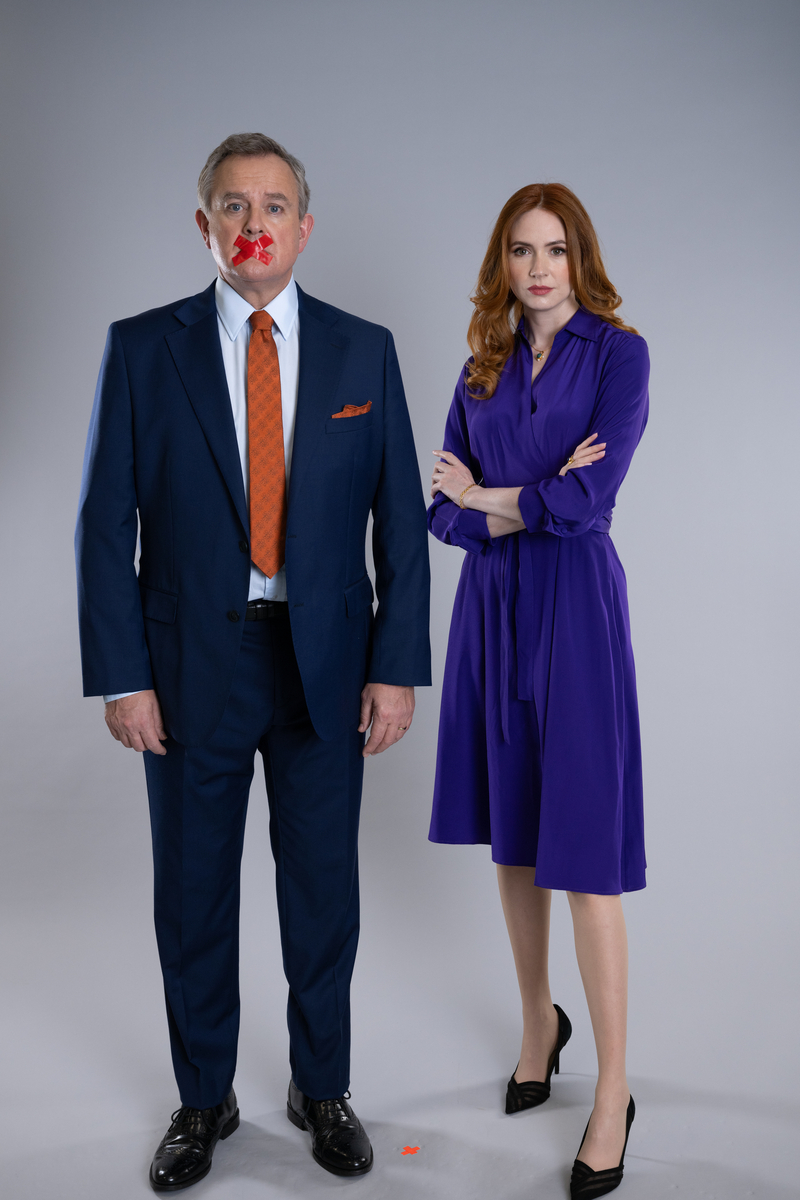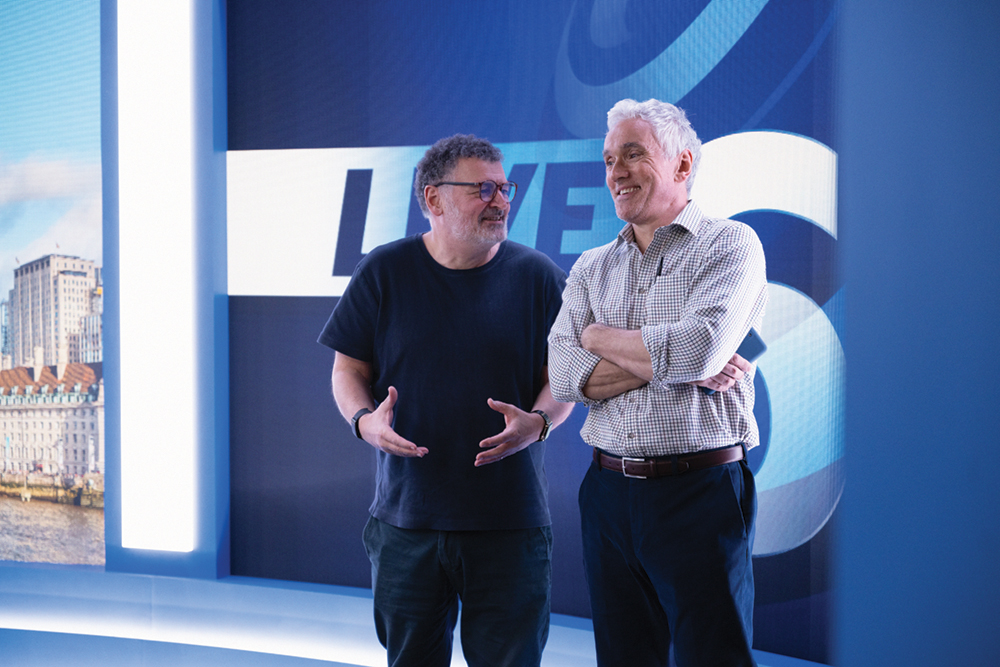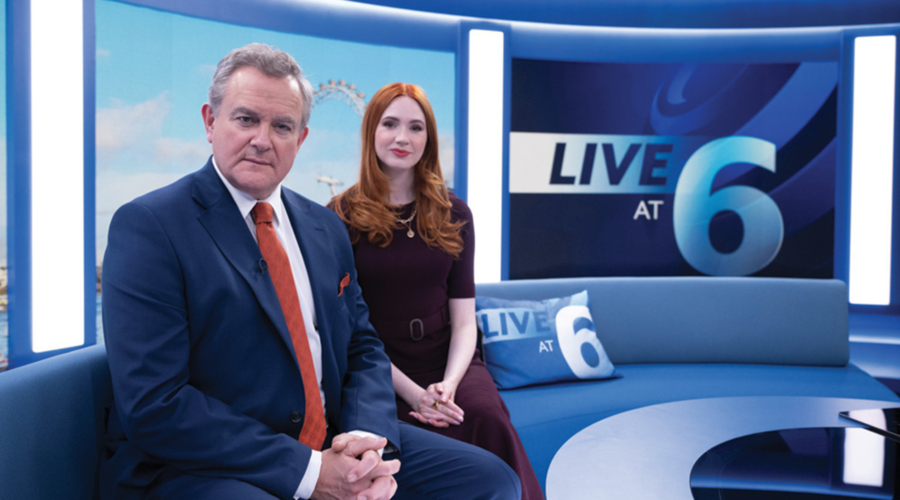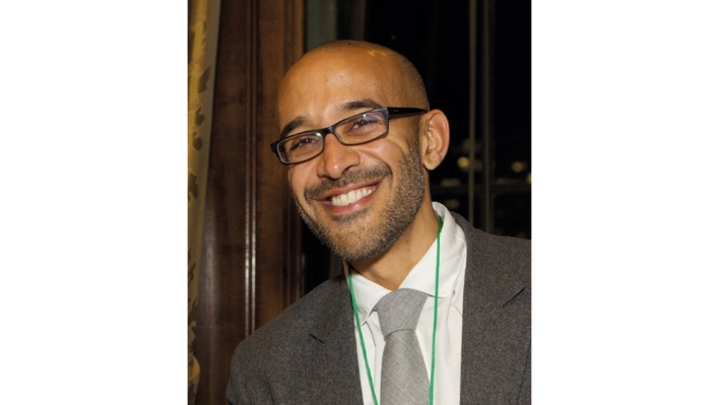Steven Moffat explores what happens when a newscaster makes an off-colour joke. Shilpa Ganatra reports
In an era in which Britain’s culture wars continue to rage, it takes a brave soul to sideswipe their main tenets on a mile-a-minute TV series. But if ever there were a safe pair of hands, it’s those of Steven Moffat OBE.
His ITV comedy drama, densely packed into four 45-minute episodes, embraces many more themes than cancel culture, to which the title, Douglas Is Cancelled, alludes. Also highlighted are wokeness, identity politics, mansplaining, slighting, mental health, “micro-bullying” and equality.
Hugh Bonneville, star of such TV gems as Downton Abbey and W1A, is cast as the eponymous Douglas. He says: “It’s like Steven’s got a slingshot on a train that’s going really fast, and he’s firing pebbles at different themes. Sometimes, he dwells on those themes, sometimes he doesn’t. But he always hits with deadly accuracy.”
The series also stars Karen Gillan (Selfie, Jumanji), who worked with Moffat when he was the showrunner on Doctor Who. She and Bonneville play news anchors on “Live at Six”. Douglas Bellowes is a national TV treasure, while Madeline Crow is his younger, more dynamic rival. She has Douglas wrapped around her little finger.

(Credit: ITV)
Douglas and Madeline’s relationship shifts dramatically when he is accused on social media of telling an inappropriate joke at a wedding. As he scrambles to save his reputation, the truth concerning their relationship and the joke is exposed, peeled away one dramatic layer at a time.
The impressive cast also includes Ben Miles (Coupling, The Crown), Alex Kingston (ER, Doctor Who), Nick Mohammed (Ted Lasso, Intelligence) and Simon Russell Beale (Penny Dreadful, The Death of Stalin), while Madeleine Power (Six Wives, The Last Kingdom) plays woke teenager Claudia.
Moffat’s intention wasn’t to lampoon the buzzwords du jour. Rather, it was to examine the dynamics that we grapple with today. “I was interested in what Sue [Vertue, his wife and the show’s executive producer] calls micro-bullying. Everyone bullies someone and everybody is bullied by somebody. It’s not always in the obvious behind-the-bike-sheds way.
“Office politics are complicated. I witnessed it second-hand [through Vertue], and the difficulties of being a powerful woman in a workplace (and sometimes its advantages) are complicated. So it’s interesting to see what happens when you let characters (in a TV series) attack each other.”
Moffat began working on the series after stepping back as the Doctor Who and Sherlock showrunner in about 2017 (although he has written a Doctor Who episode for the new series). This was before the terms “cancel culture” and “woke” were coined and when the #MeToo movement was beginning to gain traction.
The idea came from a story about “a person who I will not divulge”, Moffat says. “It’s not the main part of the plot, but he was caught misbehaving and thought it might come up in an interview, so he had to have a rehearsal interview with a junior colleague. I was fascinated with the idea of how on earth that would work.”
With this germ of an idea, Moffat developed the script, first as a play, then as a film. “But I was concerned that, as a film, it would never get released because most films like that don’t,” he says. He rewrote it as a four-part series.
Like much of Moffat’s work, Douglas Is Cancelled is produced by Hartswood Films, the independent founded by his late mother-in-law, Beryl Vertue, where his wife, Sue Vertue, is a producer and he is Creative Director.

Working so closely with his wife “is not an issue”, says Moffat. “Child rearing is the real work – television is what we do for fun.”
The scripts were received with open arms by ITV. But an American co-producer was less forthcoming, says Vertue. “Everyone was very nervous. No one was putting their hands in their pockets… They’re getting slightly less jittery now, but they have been very jittery for the past 18 months. And very concerned about casting – but, of course, you don’t cast it properly until you’ve got the money together, so it was a bit chicken and egg.”
Closer to home, BBC Studios became involved as the international distributor, while SkyShowtime came on board as co-producer, which plugged the funding gap.
The all-star cast is bound to have piqued the interest of international broadcasters. Gillan is based in Los Angeles and is making waves in Hollywood, aided by her high-profile role as Nebula in the Marvel Cinematic Universe.
She had read Moffat’s scripts early on and made it “a priority” to return to the UK for the project. “There was no difficulty fitting this in because it’s the most exciting thing that I’ve been involved in for ages,” she says. “I really enjoyed playing a female character that you immediately see as manipulative and ambitious.
“Those words can sometimes have a negative connotation to them. However, if you continue to watch this series, you learn Madeline’s backstory, and you realise that she’s the result of the environment she’s been put into. She’s developed these qualities to survive the workplace.”
Gillan adds: “The story reflects people’s stories within the industry. Things are getting better and headed in the right direction, but there’s still a way to go.”
Reflecting its roots as a play, the series centres around big set pieces, largely two-handers featuring quickfire verbal volleys. Their intensity – some takes were 10 minutes long – called for a fortnight of rehearsals before filming began. That was an “unusual luxury”, says Moffat, but one that added rigour to these pacey, dramatic moments.
‘A joke is just truth at speed – a high-impact insight’
“Sometimes you have rehearsals that turn into a slightly pointless discussion of the script,” he says. “But with this, it meant Ben [Palmer, the director] became very clear on the shots he was taking, and the actors were on top of their material, as you have to be when you have that much of it. All the narrative beats come from the performance, and you need it to be razor sharp.”
Much like in W1A and The Thick of It, the delivery was so fast-paced that, even though scripts were 60 pages long, they fell short of making 45 minutes of screen time – prompting Moffat to add scenes and characters.
These additions didn’t upset the show’s balance, which expertly offsets moments of light and shade, while respecting the gravity of its darkest topics and satirising others.
Moffat says: “It’s always important to have humour. If the audience laughs, you have said something to them that they know is true. A joke is just truth at speed – a high-impact insight. So there is no difficulty in marrying comedy to a serious subject.
“In fact, I would argue that’s where comedy belongs. Basil Fawlty was very serious about running that hotel, and we did not see him having a good time. From his point of view, Fawlty Towers was a drama series.”
Douglas Is Cancelled is a distinctive, multifaceted series that holds up a mirror to contemporary society, inviting us to re-examine our opinions by playing out the scenarios that happen behind the headlines. But don’t expect easy answers – the crux of the matter lies in its complexity.
Moffat says: “In this show, everyone gets to be right. And everyone gets to be wrong. And there are no heroes.”
Douglas Is Cancelled airs from 3 June on ITV1 and ITVX.







